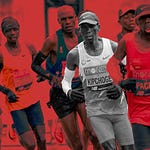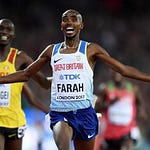You can listen to this episode of our Top 5 stories of the week right here 👆 by pressing ▶️ or in all the usual podcasting apps. Here are the links to a few spots for you to listen and subscribe 😉 :
Note: this week’s pod started with a hearty discussion of the ethics and rules (or lack thereof) when running a virtual race, and in particular the marathon. Then we get into the following stories. Enjoy!
1. Another Special World Record Event
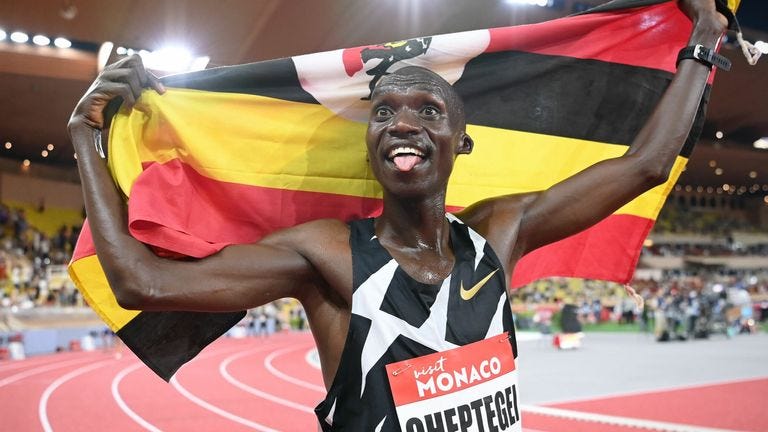
Joshua Cheptegei, the 24-year-old Ugandan who set a new 5,000m world record last month, is attempting to break the 10,000m world record on October 7 in Valencia.
Cheptegei will attempt to run faster than Kenenisa Bekele’s best mark of 26:17.53, which has stood as the world record for 15 years, at the NN Valencia World Record Day. There, he will pace himself by chasing a light moving at world record pace on the track’s inside rail, like he did in Monaco on route to a 5,000m time of 12:35.36.
Cheptegei’s current 10,000m best is 26:48.36, but his blistering 5,000m time and 15k world record of 41:05 is making observers and pundits wonder how much faster he can get. Renato Canova, the Italian distance coach famous for having coached world class talents Saif Saaeed Shaheen and Caleb Ndiku, said he thinks 25:59 is possible for the Ugandan.

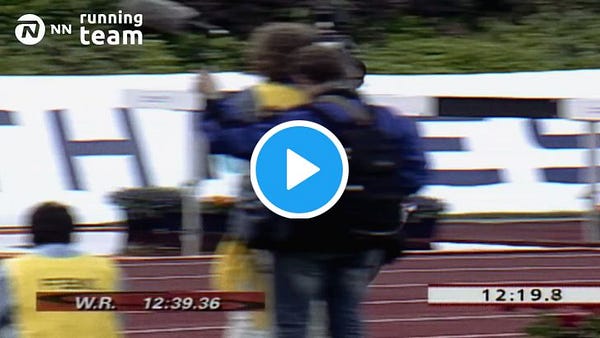
2. No More “Full Protection” for the Former World Athletics Boss
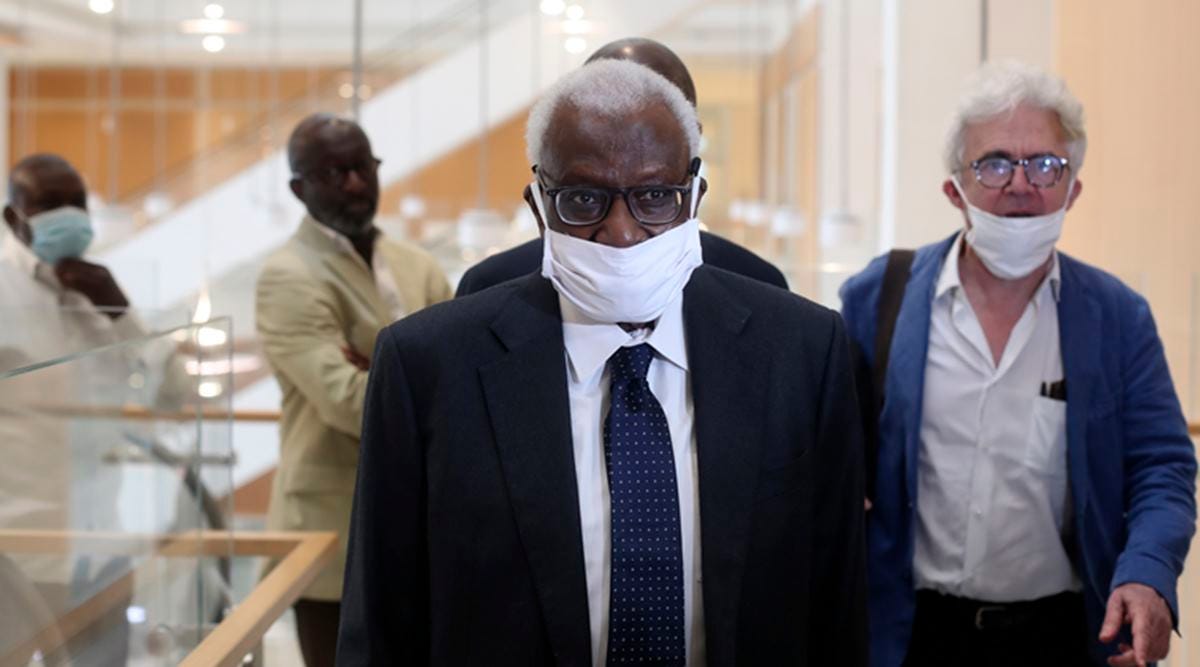
Lamine Diack, the former President of World Athletics, was found guilty of bribing Russian athletes and covering up their doping infractions. Photo: The Guardian.
Lamine Diack, the President of World Athletics between 1999 and 2015, was sentenced to two years in prison and fined 500,000 euros for taking almost $4 million US in bribes from 23 Russian athletes and covering up their doping infractions.
The scheme was dubbed “Full Protection” and involved at least five other senior administrators, who all received jail time. One of them was Diack’s own son, Papa Massata Diack. He was fined one million euros for funneling bribe money into his own business ventures.
The senior Diack, who is 87 years old, was told by the judge he could expect conditional release because of his age. Both father and son said they planned to appeal their sentences. Papa Massata Diack told The Guardian “I am appealing their stupid decision. My lawyers were not there in June because of COVID-19. This trial was a joke.”


3. Sexagenarian Runs a Half-Marathon Faster than You Can
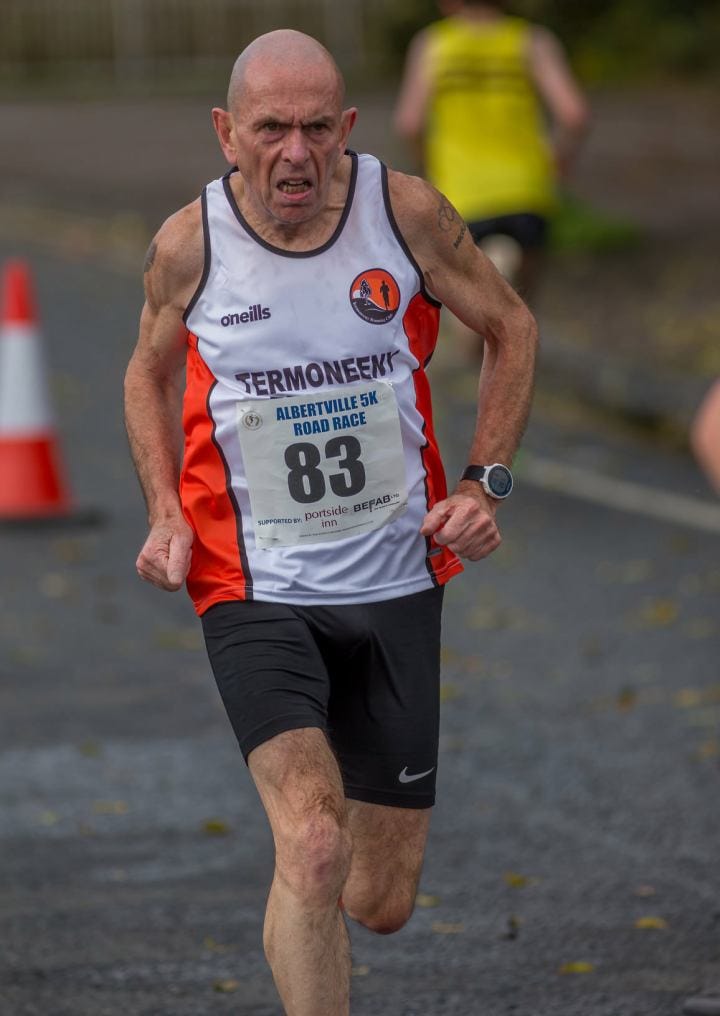
Tommy Hughes, Photo by John T Glover
Last week, 60-year-old Irish runner Tommy Hughes broke the men’s 60 and over half marathon world record at the Antrim Coast half Marathon in Northern Ireland, running 1:11:09. Martin Rees of Great Britain held the previous record at 1:11:31.
The record adds to Hughes’ list of growing accolades. In addition to competing in the 1992 Olympic marathon, Hughes ran the fastest marathon in history for men 55 and over (2:30:15) when he was 59, and he and his son Eoin hold the record for fastest marathon by a father and son with an aggregate time of 4:59:22 (Hughes running the faster time of the two).
Despite finishing 33, Hughes stole the show, shifting the limelight away from Mo Farah who won the race in 1:00:27, barely a week after setting the hour-on-the-track world record.
4. Watching the Diamond League on YouTube (for free)
International track meets are still going strong well into September, and now you can watch the Diamond League meets live streamed on Youtube. Last week saw two major international meets. The first was in Zagreb, Croatia: the Memorial Borisa Hanzekovica.
This was a smaller meet but no less impressive. The men’s 800m produced the most notable results. The Brits went 1-2-3, led by 23-year-old Daniel Rowden in 1:44.09. He was followed by Elliot Gilles and Jake Wightman with pre-race favourite American Bryce Hoppel falling to fourth in 1:44.95.
The men’s 1500m also had a good showing with eight of the 12 finishers running personal bests. The race was won by Aussie Stewart McSweyn in 3:32.17.
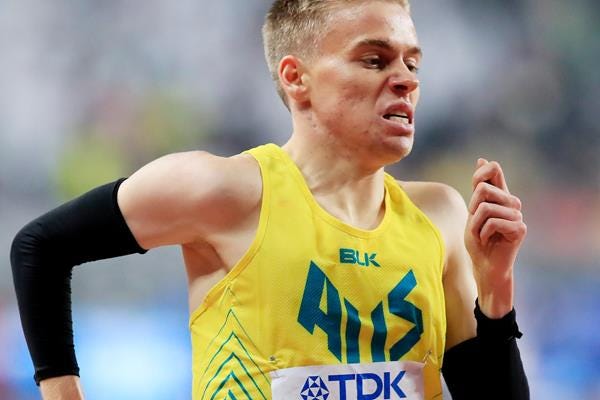
Stewart McSwyen
A few days later, the second last Diamond League meet of the season took place in Rome. Here, fans were treated to a blistering men’s 3,000m. Four national records went down. First, Jacob Kiplimo set the Ugandan record and ran a world leading time of 7:26. Jakob Ingrebrigsen was second in 7:27, setting the Norwegian record. Third was Stewart McSweyn in 7:28 (fresh off his 1,500m win in Zagreb), setting an Australian record. And fourth was Yemanebirhan Crippa, breaking the Italian record in 7:38.
Not to be outdone, British runner Jemma Reekie stole the show in the women’s 800m running another 1:59. She was followed closely by training partner and roommate Laura Muir who finished third.



Finally, Karsten Warholm ran a blistering 400m hurdles, clocking 47.07, just shy of the 46.87 world record. Warholm has now run six of the 13 fastest times ever over 400m hurdles.
5. Eliud Kipchoge Believes that You can Run a 2-Hour Marathon (Yes, You Read that Right)
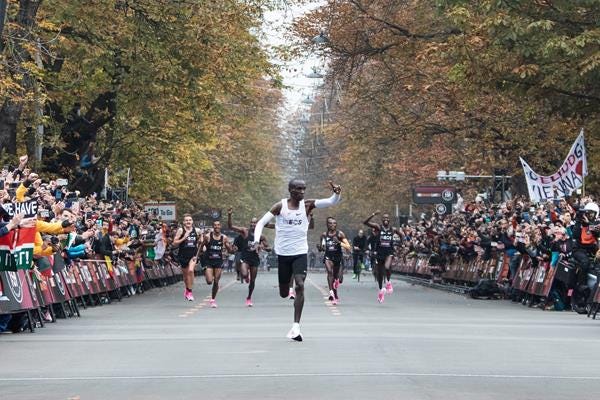
Eliud Kipchoge
The publication Firstpost.com interviewed marathon world record holder Eliud Kipchoge, asking about how the Nike Vaporflys have helped his running, his thoughts on the upcoming London Marathon (where he’ll face off against Ethiopia’s Kenensia Bekele), and whether he thinks anyone else can break the 2-hour mark in the marathon.
In Kipchoge fashion, he gave vague but wise-sounding platitudes about all three subjects. In respect to the Vaporflys, he said “It is my legs that are still doing the running.” Adding that “[i]nnovations are part of sport and always have been. With running, the effect of technology will always be minimal especially if you compare it to other sports.”
When asked about the London Marathon, Kipchoge said it was hard to tell whether the short, looped course would be fast, but felt his track background might help with the course’s repetitiveness.
While he didn’t throw down any time predictions for the race, he did address the 2-hour barrier, which he broke in an unsanctioned race in Vienna last year. When asked whether he thought there was anyone else who could break the barrier, Kipchoge said: “Everyone who believes that anything is possible. Everyone who believe in themselves and are ready to train with discipline.”







